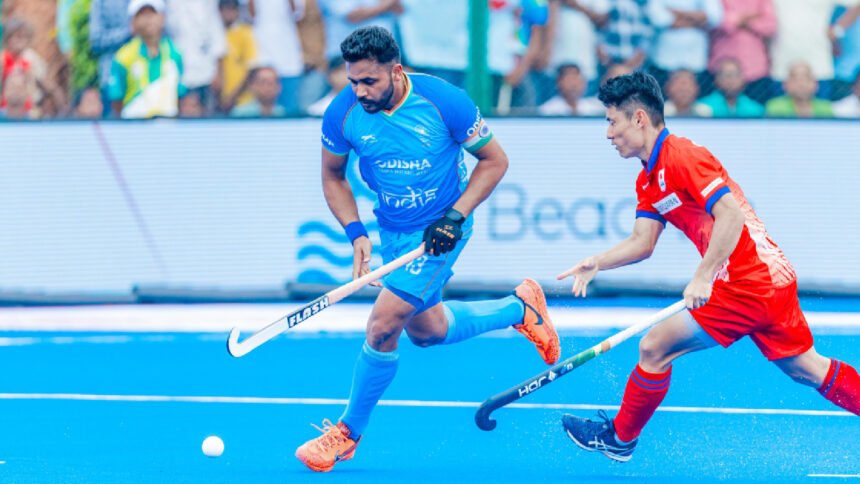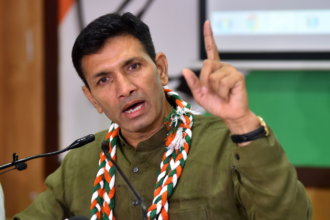India took off at the scorching speed of the Japanese Shinkansen. By the time they reached their destination, they were huffing and puffing like the good old Indian passenger train.
They can blame it on the heat — at the 3 pm push-back, the weather apps suggested it ‘felt’ like 42 degrees Celsius. It was, however, Japan that made them sweat. The sharp, counter-attacking Japan that refused to be knocked out by the early blows, put up a stubborn fight and, despite the 2-3 loss, gave Craig Fulton’s India enough to ponder over before the serious business — the Super 4s round of the Asia Cup — that begins in a couple of days.
Not a single Indian player celebrated Sunday’s hard-fought win. Abhishek, the forward who was named the Player of the Match, was tch-ing and tut-ing when asked to summarise the performance.
But when the afternoon began, the emotions were contrasting. A beaming Yoshihiro Anai declared his team would play ‘defensively solid’ hockey and attack India on the counter. It took five minutes for India to wreck the Japanese coach’s plan.
 In the stifling Rajgir heat, it was always going to be tough for India to continue playing with the same intensity. As the pace of the game slowed down, Japan, too, gradually found their footing. (Hockey India)
In the stifling Rajgir heat, it was always going to be tough for India to continue playing with the same intensity. As the pace of the game slowed down, Japan, too, gradually found their footing. (Hockey India)
Flying start
A beautifully worked field goal and a bamboozling drag flick did not even allow the former Asian Games champions to put up any resistance. Forced to switch to Plan B, Japan had to step out of their half more than they would have liked to in search of goals. This left their defence more exposed, and at that moment, it seemed like India would win by a comfortable margin.
Fulton’s team began with such high intensity that Japan did not get any time to settle. Within 10 seconds of the push back, an aerial ball was played deep into Japan’s half, demanding a quick intervention from the defenders. Minutes later, Manpreet Singh took a pop at goal from the top of the ‘D’ but the ball whizzed past the far corner.
India had parked themselves in the attacking third and were rewarded in the fourth minute. Harmanpreet Singh played what looked like a harmless pass towards Jarmanpreet Singh on the left flank. The full back played it forward towards Sukhjeet Singh who made brilliant use of his 3D skills — lifting the ball, controlling it mid-air while simultaneously running forward — to enter the ‘D’ from the baseline before cutting it back for Mandeep Singh. The forward rounded off Japan’s Shota Yamada and, on the turn, pushed the ball past goalkeeper Takahashi Yoshikawa to put India ahead.
𝐆𝐮𝐭𝐬𝐲 𝐬𝐡𝐨𝐰! 💪
The Indian hockey team fought hard to register its second win at the Hero Asia Cup Rajgir, Bihar 2025, to seal a place in the Super 4s.#HockeyIndia #IndiaKaGame #HumSeHaiHockey #HeroAsiaCupRajgir pic.twitter.com/QkJnvYPcQx
— Hockey India (@TheHockeyIndia) August 31, 2025
A minute later, India doubled their lead. Shilanand Lakra used to pace to accelerate into the shooting circle. He was thwarted by two defenders from taking a shot at goal but the Indian forward drew a foul and won a penalty corner. After four retakes, Harmanpreet beat the Japanese goalie to score his fourth goal in two matches.
Story continues below this ad
It felt like the match was put to bed with two goals in the opening five minutes and a rattled opponent. India created enough chances in the second quarter to extend their lead — Abhishek ran the length of the field but couldn’t get a decent shot at goal; Hardik sliced a pass from the centre in the hope of finding Lakra but the ball, which was deflected along the way, rolled away from the forward; Dilpreet Singh played a ball across the face of the goal but once again, there was no one to tap it in.
And so it rolled on — India either lacked the quality final touch or the final pass.
In the stifling Rajgir heat, it was always going to be tough for India to continue playing with the same intensity. As the pace of the game slowed down, Japan, too, gradually found their footing.
The beautiful manner in which they opened up India’s defence showed how they grew in confidence the more the scoreline stayed the same. The move began in Japan’s half. Yusuke Kawaura and Kaito Tanaka played quick give-and-go passes to take Manpreet and Dilpreet out of the equation.
A win that takes us to the top of 𝗣𝗼𝗼𝗹 𝗔 at the Hero Asia Cup, Rajgir, Bihar 2025.
🇯🇵 2-3 🇮🇳#HockeyIndia #IndiaKaGame #HumSeHaiHockey #HeroAsiaCupRajgir pic.twitter.com/E5U6ta4w9p
— Hockey India (@TheHockeyIndia) August 31, 2025
With ample space in the midfield, Tanaka continued his march forward and passed the ball to Kosei Kawabe, who received the pass on the go, took a touch to move away from the Indian defenders and, with his back to the goal, unleashed a powerful hit on the turn. Sanjay, who had another average outing, was a little out of position while Pathak’s vision seemed to have been blocked by Jugraj Singh.
Story continues below this ad
Any hope of a Japanese fightback was quickly quelled after Harmanpreet restored the two-goal cushion eight minutes later. But Japan would not go down so easily.
Even though the scoreline was 3-1 in India’s favour, the match was a battle of equals as the stats showed — equal possession, India’s 10 shots on goal to Japan’s 9, but Japan with more penalty corners (9) to India’s 6.
Against China, India walked away with a close 4-3 win, knowing they were clearly the better of the two teams on nearly all counts. That wasn’t the case against Japan, even though they were less disciplined defensively than China.
When Kawabe beat Suraj Karkera — who replaced Krishan Pathak in the final quarter — from a close range, a Japanese comeback didn’t seem improbable. Especially after India played the final stages of the match with just 10 men, with Harmanpreet sent to the sin bin. Somehow, they held on.
Story continues below this ad
India look set to top their group. But as the final hooter went off, Mandeep, who gave India an energetic start, was down on his hunches. And he wasn’t the only Indian player left gasping.
Scoreline: India 3 (Mandeep Singh 4′, Harmanpreet Singh 5′, 46′) vs Japan 2 (Kosei Kawabe 38′, 59′)








